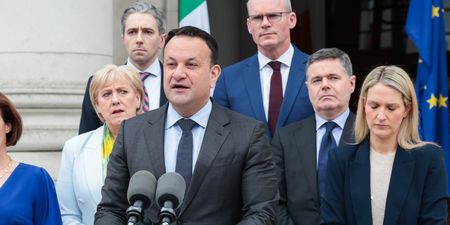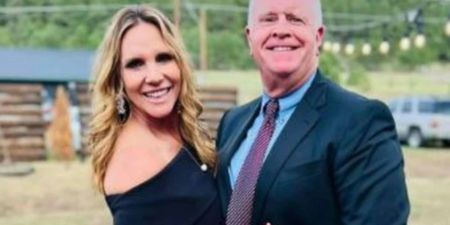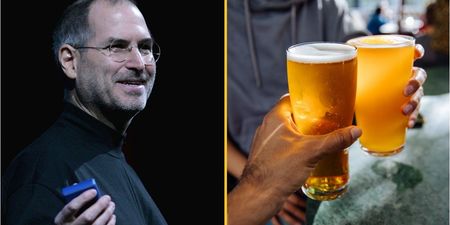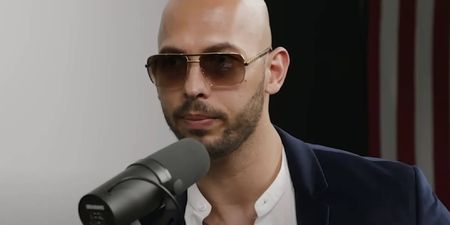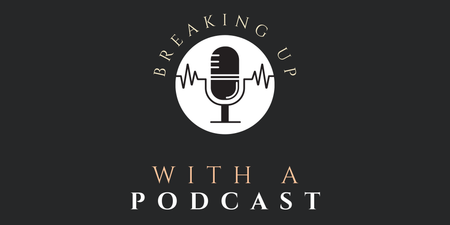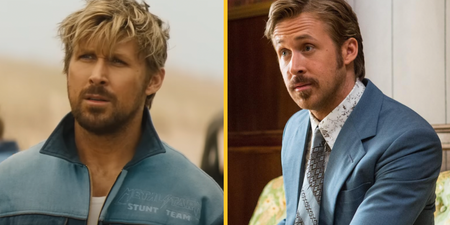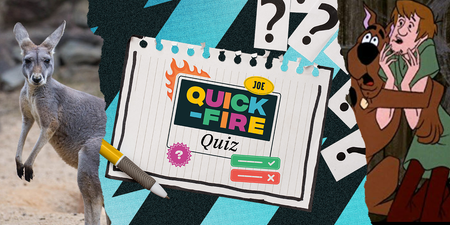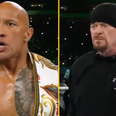Election 2020: Trump vs ______?
On Tuesday morning, Bernie Sanders announced that he’d be competing in the Democratic primary for the privilege of taking on Donald Trump in the 2020 Presidential election.
In 2016, Sanders went from a virtual unknown to a political powerhouse who only narrowly lost out to establishment favourite Hillary Clinton.
This time around, he’s joining a very crowded field — at least 10 candidates have already announced — and it’s only going to get bigger, with heavy-hitters like Joe Biden and Beto O’Rourke still considering a run.
Incumbent president Donald Trump has dominated the news cycle for about three and a half years now so virtually everyone on this side of the Atlantic, or any side of the Atlantic, has a vested interest in American politics… but its circus-esque nature can make it hard to follow.
How does it work? Who’s involved? Who’s going to be the next president?
A revolving cast of complicated characters and concepts will define the news cycle for the next 18 months before the American public has their say once more. Now is your chance to become the American political expert you’ve always wanted to be with the JOE Election 2020 Guide.
When is Election Day?
Election Day is 3 November 2020. It’s still a long time away. After the election is decided, there will be a two-month handover/transition period that will end with the inauguration of the new president outside the US Capitol Building in Washington DC. That’s when the US will have a new president, or Donald Trump again.
How does the actual presidential election work?
Thanks to the drama it has caused in recent years, most people will be familiar with the phrase “electoral college” — but plenty of Americans don’t even know what it means.
The electoral college is the system by which the American president is selected. Citizens in each state vote for their preferred candidate, and each state has a certain number of “electoral college” votes.
Between all 50 states, there are 538 electoral college votes, meaning that a candidate needs 270 to win. Once a candidate has won enough states to have secured 270 electoral college votes, it’s game over, and that candidate becomes the president-elect.
The national popular vote takes a backseat. Democrats have won the popular vote for four of the last five elections since 2000, but they’ve only won the electoral college vote twice. Hillary Clinton and Al Gore both secured the popular vote but didn’t win enough states to clinch victory.
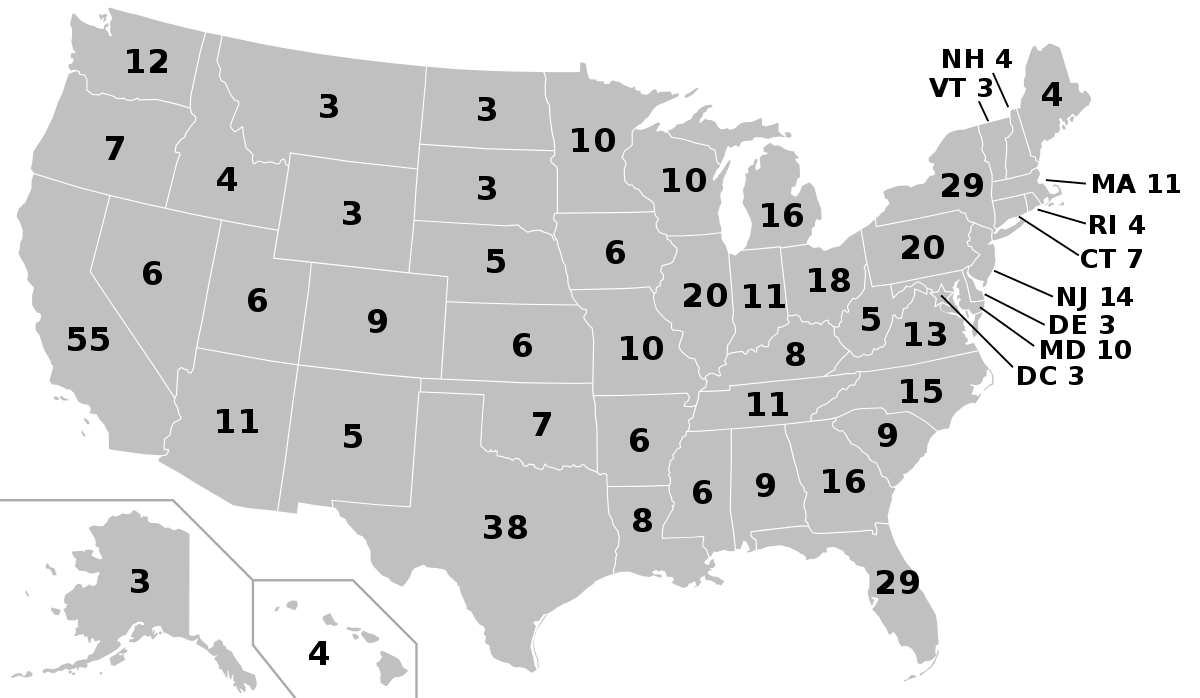
Some states are much more important than others. California, for example, has 55 electoral college votes compared to Montana’s 3. But in modern times, California always votes Democrat, so it’s pretty much a foregone conclusion.
States like Washington (blue), New York (blue), Texas (red) and Georgia (red) have lots of electoral college votes too… but they typically only vote one way.
That’s why the most important states are the ones with a lot of electoral college votes, but unpredictable voting patterns. States like Ohio, Florida, North Carolina, Pennsylvania and Michigan are “swing states” — states which have gone for Republicans and Democrats in the last 16 years. Between them, they carry 98 electoral college votes.
All in all, a candidate could hypothetically win the presidency by winning just 11 states: California, New York, Texas, Florida, Pennsylvania, Ohio, North Carolina, Illinois, Georgia, Virginia and New Jersey. This means that, theoretically, a candidate could win the entire country with just 27% of the popular vote.
What are ‘primaries’ and how do they work?
Unlike Ireland, where presidential candidates must be nominated by 20 members of the Oireachtas or by four local authorities, the United States has primary elections.
There are open primaries, there are semi-open primaries and there are closed primaries. These are what they sound like. Anyone can vote in an open primary, and only party members can vote in a closed primary. Semi-open primaries are open to all registered voters.
Semi-closed primaries are where the state allows unaffiliated voters to vote, but the party can decide to only allow its members to vote.
The first primary is the Iowa caucus, which will be on 3 February 2020, followed by the New Hampshire primary on 11 February. Because these primaries come before all the others, they’re often given a lot of importance by the media, as they can help candidates build momentum. These will be followed by Nevada and South Carolina, which will offer insight into how each candidate is performing with more diverse demographics.
After these four is “Super Tuesday”, which could see as many as 11 states decide their number one choice all at once.
Who’s running?
Cory Booker – Senator, New Jersey
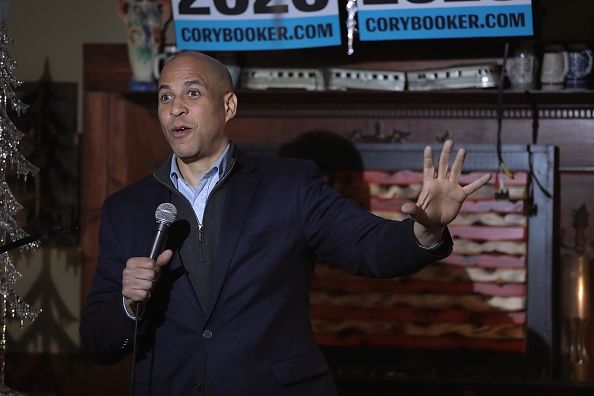
Rhetorically, Booker has a touch of the Obamas about him. He talks about love a lot. He’s well able to dip into pop culture chat while sounding like a totally normal human being — something that’s surprisingly hard for politicians to do. He’s a vegan, and he’s not married (he has a girlfriend).
Pete Buttigieg – Mayor of South Bend, Indiana
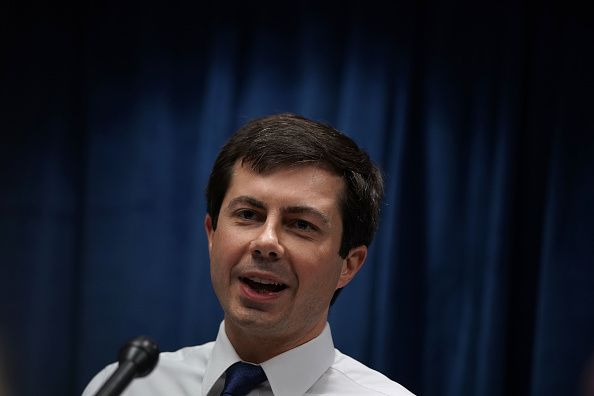
If Buttigieg made it as far as the Oval Office, he would be the first openly gay president that America has ever had. He would also be one of the least experienced.
Buttigieg (boot-a-judge) is the baby-faced mayor of South Bend, Indiana, and he’s campaigning on a platform of a “different kind of politics”. He has military experience, he’s hugely popular in his constituency, and newspapers have been writing about the possibility that he’ll become president since forever. He’s also from the same state as incumbent VP Mike Pence, whose anti-LGBT stances are well known.
This gives Buttigieg a very handy issue to zero in on and a more personal beef with the Trump administration than some of his fellow competitors. In an anyone-but-Trump atmosphere, Buttigieg could actually end up outperforming expectations. Very unlikely to win though.
Julian Castro – Former Mayor of San Antonio
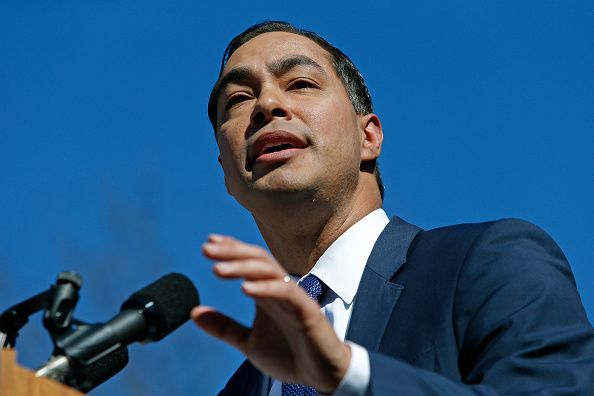
The unique selling point in Castro’s campaign is his history in Barack Obama’s cabinet, where he was Secretary of Housing and Urban Development.
Obama is a popular figure among Americans these days, but getting the wider electorate to care about this relatively tangential connection will be a challenge for Castro. Probably more important is that he’s popular in San Antonio, and Democrats would love to turn the typically red Texas into a battleground state as Beto O’Rourke did during his Senate race against Ted Cruz in late 2018.
An outside bet, but a bet nevertheless.
Kamala Harris – Senator, California

2019 began with a raft of announcements, but nobody has had a better rollout than Kamala (pronounced like comma-la) Harris.
Harris has forced her way into the national spotlight with tough, uncompromising performances during Senate hearing for Trump key figures. Democrats looking for someone who’ll bite back against Trump’s bullying style need look no further beyond Harris.
The issue with Harris is that she might not progressive enough, and when push comes to shove, that’s not likely to matter very much. She’s eminently electable, and can shift between being tough on crime and tough on corruption to progressive positions on marijuana and criminal reform.
Harris is a smooth talker and comes across very well on camera, and in an arena where the ability to go viral matters more than ever, the 54-year-old could be at a huge advantage, particularly when it comes to the debates, which could be decisive.
Tulsi Gabbard
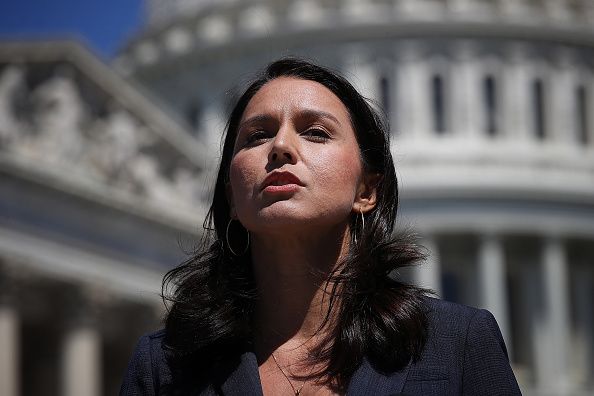
Of all the candidates on this list, Gabbard is probably the least likely to make a substantial fist of a primary run. She was a staunch supporter of Bernie Sanders in 2016, and there is speculation that with Sanders in the race, there are very few votes for Gabbard to sweep up. To consider her a major candidate becomes more generous by the day.
Historically, Gabbard has made some anti-LGBT comments which are unlikely to slip past the radar of the Democrat base, which gets more socially progressive by the day. She also has a history of meeting Syrian leader Bashar al-Assad, and recently refused to say he was an enemy of America’s. So. We’re not sure Tulsi Gabbard 2020 has legs.
Kirsten Gillibrand – Senator, New York
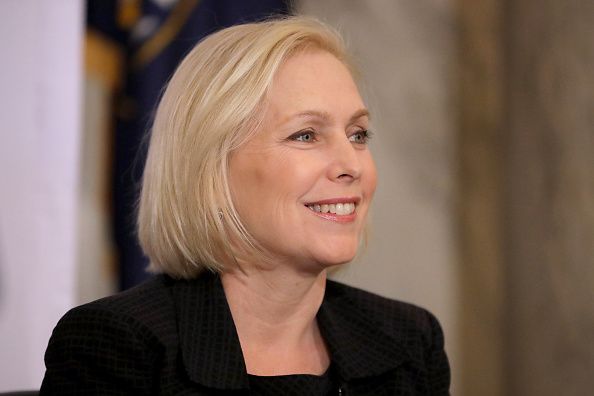
60% of Democratic voters are women, and it’s women that Gillibrand will be focusing on. Asked why she was running for President, her answered centred on the fact that she’s a “young mom” — her policies are about making healthcare a right, making sure public schools are better and taking on institutional racism, corruption and special interests.
On a national level, Gillibrand is probably best known for calling on her fellow Democratic senator Al Franken to resign following well-substantiated accusations of sexual misconduct against him. Gillibrand definitely doesn’t have the reputation for tough debating that Harris or Klobuchar do, but it’s way too early to write her off.
She also has a more familiar relationship with Wall Street than many of her competitors, so you can expect her to have plenty of money to put into the campaign.
Amy Klobuchar – Senator, Minnesota
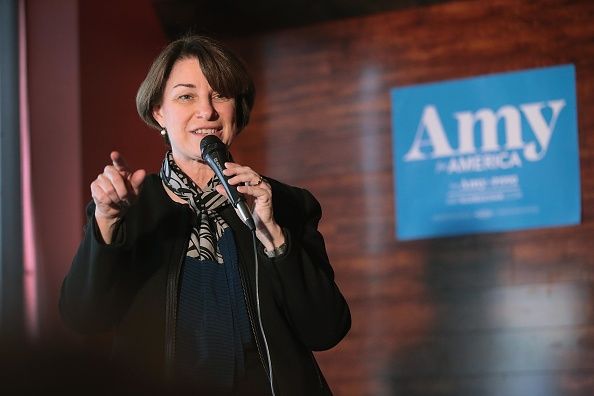
The Democratic platform has shifted leftwards since Clinton’s 2016 failure, and the same is true for most of the potential candidates to face Trump. Klobuchar has a chance to set herself apart as a more “middle-ground” candidate who can appeal to rust-belt states that were crucial for Trump’s win over Hillary. She’s not talking about healthcare for all, minimum wage or other issues that seem to be at the centre of the primary race.
Klobuchar (that’s pronounced klo-buh-shar) also has a stellar record in electoral politics, having won almost all of her previous bouts with landslide percentages of the vote. No mean feat in a midwestern state like Minnesota. Her “Minnesota nice” folksy charm will likely be at the centre of her appeal.
Still, for all that charm, she proved her chops with a very strong cross-examination of Supreme Court Justice Brett Kavanaugh — which has likely deeply endeared her to the Democratic base.
She’s a dark horse for now, but if Joe Biden is to enter the race, pretty much all of Klobuchar’s unique selling points are no longer unique.
Bernie Sanders – Senator, Vermont
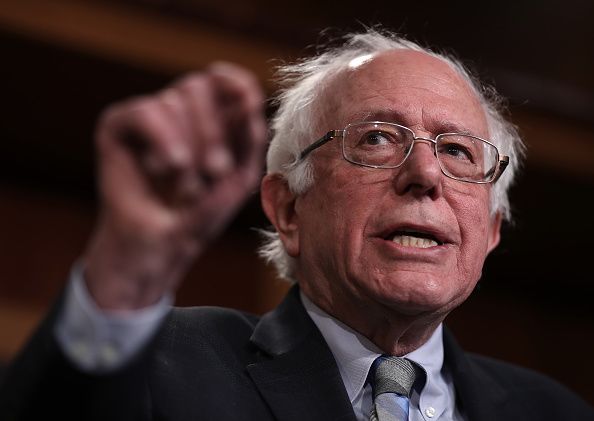
Sanders’ influence can be seen throughout the field and further into American politics. Whether its the ascendancy of progressives like Elizabeth Warren into the mainstream or the notoriety of firebrand upstarts like Alexandria Ocasio-Cortez, much of the Democrat shift leftwards has been the result of Bernie Sanders’ 2016 presidential campaign.
As things stand, Sanders is the best known candidate. He has the best developed ground game in early states that will be vital for momentum. Everyone in the Democratic party knows exactly what he stands for, and after 40 years of public service its unlikely that any new information will emerge to sink him. Sanders is the frontrunner for now, which is pretty worrying for Democrats, since he’ll be 79 by inauguration day, and isn’t even officially a Democrat.
Sanders, though, will be deeply wounded by his loss to Clinton last time around, and those looking to tear him down need only point to his failure a few years ago. Sanders will have to do something differently to prove he’s a better candidate this time around.
Elizabeth Warren – Senator, Massachusetts

Elizabeth Warren is sort of a Bernie-lite candidate. Not as explicitly socialist, but still an enemy of the billionaires. Her main policy position is the introduction of a wealth tax that would skim off the top from America’s elites. It’s a popular policy, and most of Warren’s positions are popular (healthcare for all, the Green New Deal, etc).
Warren would also be more attuned to the gender politics that has become so crucial in the Me Too movement.
The 69-year-old is a strong candidate when it comes to policy, but there are drawbacks too.
Warren has been nicknamed “Pocahontas” by Donald Trump, a reference to a controversy that continues to dog her. When she was younger, Warren drew on very distant Native American ancestry to further her career as a lawyer and Harvard professor, availing of minority status even though she was only about 1/126th Native American. The issue has never stopped plaguing her, but if she can keep the primary focused on policy rather than presentation, she’s a very strong candidate.
Who might be running?
Joe Biden
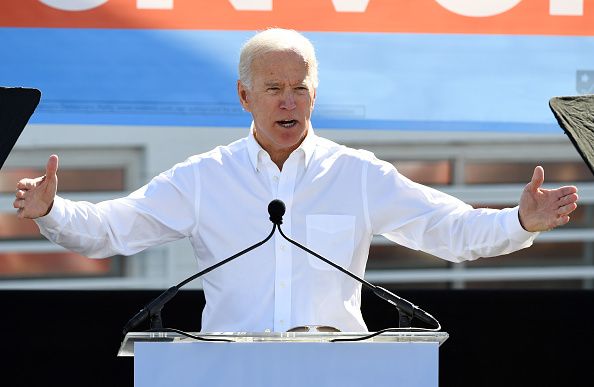
Should Joe Biden choose to enter the field, he would find himself atop the polls immediately. He has the distinct advantage of being better known than every other candidate on the list — because he’s already been Vice-President for eight years.
When it comes to independents who can’t stand Trump but also really don’t want to vote left-wing, Biden’s centrism would be perfect — and his tough guy, plainspoken style would probably be ideal for making a billionaire like Trump look more like the elite he is.
The field is probably too split now for Biden to have the whole party behind him, and he’d face a tough challenge, even if he is the favourite. The longer he delays an announcement, the worse his chances get.
Beto O’Rourke
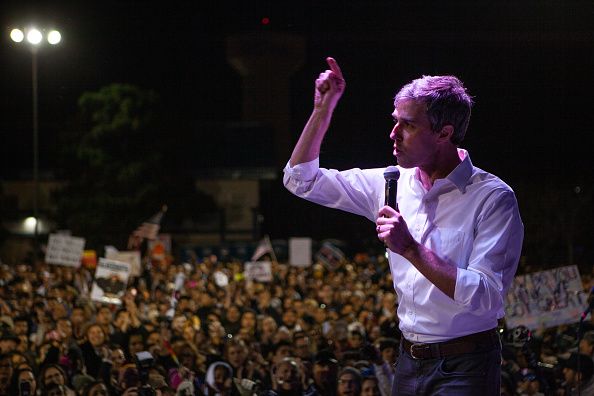
Since taking on Ted Cruz for a senate seat (and losing), O’Rourke has been travelling around America — chatting to people and blogging. Ostensibly, he’s deciding if he wants to run for president.
He’d immediately drop into the inexperienced category… but he does have name brand recognition from taking on such an unpopular senator as Cruz. A bit like Biden, he’d also probably play better with the “white male” independents who would probably be voting Republican if it weren’t for Trump.
He’s a good speaker, looks good on camera, his policy platform is extremely uncontroversial among the mainstream. The only bad news is that he lost to Cruz.
Howard Schultz
The Starbucks founder’s quasi-announcement was roundly mocked on Twitter and his calls for the Democrats to nominate a centrist seem to place him quite far out of touch. He seems to be shocked by just how much Democrats don’t want him to run. He’s still thinking about it, but surely since asking the internet for their thoughts on Schultz 2020, he’s feeling less enthusiastic.
He seems sincere in his desire not to split the vote in a way that would help Donald Trump. If he really doesn’t want to do that then he’s probably going to bail on his bid.
Will there be a Republican primary?
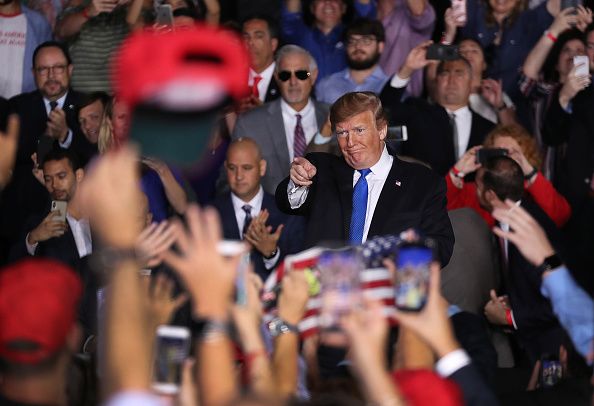
There will be a Republican primary but whether any Republican will challenge Trump remains to be seen. Bill Weld, who ran for Vice President last time alongside noted idiot Gary Johnson, has voiced his intention to run. Weld was with the Libertarian Party last time around, but this time he’s looking for a nod from the GOP. Unlikely.
More of a threat would be Maryland governor Larry Hogan. As far as Republicans go these days, Hogan is extremely moderate — supporting pro-LGBT laws etc. He has regularly criticised Trump and taking down Republican presidents is in his family. His father was the first Republican on the House Judiciary Committee to call for the resignation of Richard Nixon.
Still, Trump remains hugely popular with Republicans, so it’s hard to see Hogan actually doing Trump all that much damage. If he managed to win even a few important primaries, though, he could give an indication that Trump is weak where he needs to be strong.
Who’s going to win?
I have no idea.
LISTEN: You Must Be Jokin’ with Aideen McQueen – Faith healers, Coolock craic and Gigging as Gaeilge




